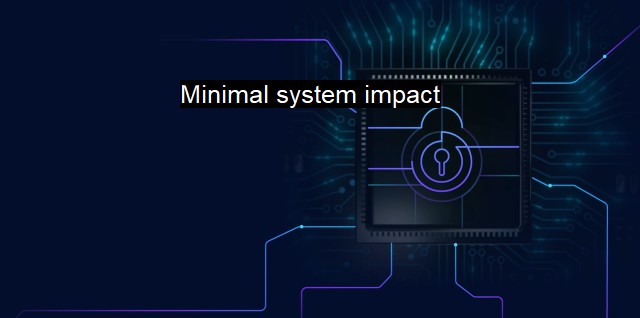What is Minimal system impact?
Balancing Security and Performance: The Significance of Antivirus Software with Minimal System Impact in Today's Cybersecurity Landscape
Minimal system impact, with is a determinant of how an antivirus software affects a system’s performance while it is running. It measures how much processing power, memory, data plans, network and system resources that a cybersecurity program uses. The less resource it uses, the less system impact it has on the operations and tasks of the said system.One could argue that a cybersecurity program with a minimal system impact is more advanced and modern because security should not compromise performance. High-performing products make it possible for users to run multiple applications simultaneously and not to have to sacrifice user experience in order to maintain security. The main goal of a cybersecurity product is to protect the system with minimal performance impact as possible so as not to interfere with regular operations.
Performance issues may arise when installed antivirus software utilizes higher system resources for its operations. Some antivirus software takes up too many resources to function, which leads to overall system sluggishness. More often than not, they affect processing power and memory which may hinder other applications from running efficiently, lead to longer boot times and occasional system crashes. Therefore, one critical factor to consider when choosing antivirus software is how minimal its system impact is.
With a constantly active antivirus software that uses up a lot of system resources, it affects the system’s power consumption which can lead to faster battery drainage in mobile and portable devices. It could also lead to higher electricity costs for non-portable devices. Thus, a more burdening antivirus will not only cost the user their laptop’s battery life but can ultimately result in increased energy bills. This has to be taken into account especially for systems running on battery sources or limited power.
With technological advancements underway, many cyber-security companies aim to perfect an antivirus program that is lîtweight and power-efficient. This includes cloud-based antiviruses that perform their scans and updates in the cloud and have most of their heavy computations done remotely, hence reducing the workload on the user’s device.
Notably, minimal system impact also extends to the space the antivirus software takes on the user’s hard drive. Ideally, a good antivirus program will install quickly, utilize minimal disk space and will not require user intervention for updates or routine operations.
Modern premium cybersecurity software usually tries to balance the underlying complexities of providing a performant and powerful security solution with the reduced user’s system impact. This might also involve performing scans and antivirus operations during the system idle times and manifesting a quick and unnoticeable recovery when interrupted.
Minimal system impact thus, is a configurational imperative when implementing cybersecurity measures. It not only increases the system’s functionality and productivity but also protects the device in an unnoticed manner. Today, more spotlight is put on the minimal system impact of software, pushing for improvement in efficiency and less overreliance on system resources.
All in all, a cybersecurity program with minor system impact benefits its users by securing their systems without impeding their experiences or causing performance issues. Above all, a minor system impact will ensure that protection is continual and robust while not compromising the performance or usage of the system device.

Minimal system impact FAQs
What is meant by minimal system impact in cybersecurity and antivirus?
Minimal system impact refers to the ability of cybersecurity and antivirus software to operate without significantly affecting the performance of the computer system on which it is installed. The software should use minimal system resources and not cause any lag or slowdown in the normal operations of the computer.Why is it important for cybersecurity and antivirus software to have minimal system impact?
It is important for cybersecurity and antivirus software to have minimal system impact because if the software uses too many system resources, it can slow down the computer, causing a negative impact on productivity. This can result in the user disabling or uninstalling the software, leaving the system vulnerable to cyberattacks.How can users ensure that the cybersecurity software they choose has minimal system impact?
Users can ensure that the cybersecurity software they choose has minimal system impact by checking the system requirements and specifications of the software before installing it. They can also read reviews and feedback from other users who have installed the software to gauge its impact on system performance.What are the benefits of using cybersecurity and antivirus software with minimal system impact?
The benefits of using cybersecurity and antivirus software with minimal system impact include increased productivity, improved system performance, and reduced frustration for users. The software operates in the background without causing any slowdowns, allowing users to carry on with their work uninterrupted. Additionally, it ensures that the system is protected from cyber threats without compromising system performance.| | A | | | B | | | C | | | D | | | E | | | F | | | G | | | H | | | I | | | J | | | K | | | L | | | M | |
| | N | | | O | | | P | | | Q | | | R | | | S | | | T | | | U | | | V | | | W | | | X | | | Y | | | Z | |
| | 1 | | | 2 | | | 3 | | | 4 | | | 7 | | | 8 | | |||||||